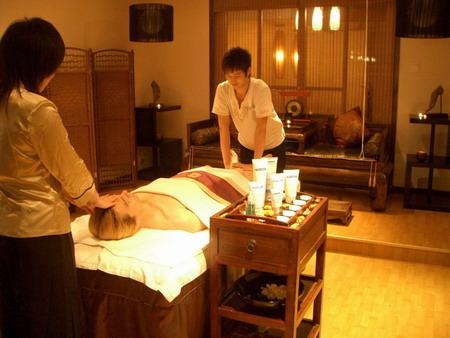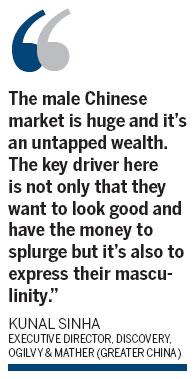
A male Chinese customer with dyed hair enjoys a treatment at Spa de Feng in Beijing. Wealthy Chinese males aged between 18 and 44 are becoming major consumers of luxury products and services. [Provided to China Daily]
B EIJING - Choose pink if you want to be regarded as bold; black to convey sleekness; purple if you want to give a funky impression, and yellow if you are in a cheerful mood. White, however, is plain old fashioned.The young Chinese male's wardrobe is a veritable rainbow of colors these days and it comes with accessories such as a gold chain or a designer-labeled monochrome bag. A Humvee or other sports utility vehicle (SUV) completes the picture.
A total of 80 percent of wealthy male Chinese consumers are aged between 18 and 44, have an annual household income of more than 250,000 yuan ($36,898.74), are well educated and are open to the acquisition of luxury products, said Kunal Sinha, Regional Cultural Insights Director, Ogilvy & Mather Asia Pacific, Shanghai.
"The male Chinese market is huge and it's an untapped wealth. The key driver here is not only that they want to look good and have the money to splurge but it's also to express their masculinity.
"It's an expression of confidence in society and to show their wealth. Take the power suit as an example." Indeed, a tailored suit gives the impression of power, importance and confidence to the wearer. Other manifestations of masculinity include buying big cars. An estimated 20 new models of SUVs are expected to be launched in China this year alone.
 Demand for services and products outstrips supply in most cases. Spa de Feng, one of Beijing's few discreet spas for men, raked in good profits during its first month of operation after it was opened by owner Xu Feng four years ago.
Demand for services and products outstrips supply in most cases. Spa de Feng, one of Beijing's few discreet spas for men, raked in good profits during its first month of operation after it was opened by owner Xu Feng four years ago.
"Previously, the proportion of my expat and local clientele stood at a 90 to 10 ratio. Today, it's a ratio of 40 to 60. It's a healthy evolution," said Xu.
On a good day, the four branches of Spa de Feng get a total of 40 clients with an average spending of 500 yuan per person per visit. The most-taken treatments are toning body scrub with marine crystals, signature four-hands massage, plant essential Swedish massage and tailor-made sea active face care.
New purchasing power
Thanks to creative marketing campaigns in recent years that have partly shaped ideas of success, lifestyle, desire and the enviable "look", consumer companies no doubt see the Chinese male consumer as another purchasing power to be actively pursued.
Glorified images of the alpha male - men who have a high social position, are confident among the fairer sex, know what they want and go for it, and are sensitive to effeminate traits - appear in glossy advertisements embodied by the usual suspects of Asian male megastars such as Liu Xiang (the mainland's Olympic 110m gold medallist), Jincheng Wu (a Japanese-Taiwanese model and actor), Daniel Wu Yanzu (a Hong Kong-based American Chinese actor), Rain (a Korean pop singer) and Jay Chou Jielun (a Taiwanese singer).
For men, it's really about using cosmetics to get ahead in their careers, a December 2008 survey by ChinaPolling showed. It revealed that almost 99 percent of male Chinese consumers regularly use cosmetics, with facial cleansers and body, hair and shaving care products being the most frequently.
The male skincare sector grew 500 percent on a compounded annual growth rate from 2001 to 2008, while the deodorant market grew 15 percent annually.
Like any young Chinese working professionals, Michel Jiang, 29, content manager at an information distribution firm, is aware of the importance of self-grooming. He spends 200 to 300 yuan on imported Japanese skincare brand Shiseido.
"For clothes, I usually go to the malls," he said. "Clothes are my biggest consumption. I buy brands such as Zara and I spend easily anywhere between 2,000 and 3,000 yuan per shopping trip." He has a stack of colognes but only uses them on special occasions.
Chinese men are making their presence known in other areas as well. They now comprise 27 percent of gold jewelry buyers, a 2009 survey by the World Gold Council revealed.
"I find that interesting. And out of the 27 percent, 30 percent of them bought gold for themselves to wear to impress their wives, girlfriends or in-laws," said Sinha.
Add these statistics to China's social situation - a gender imbalance, pursuit for wealth and prestige, fast-changing lifestyles and exposure to Western values - and it inevitably creates a paradise of business opportunities.
"The family-planning policy has created a culture of competition among Chinese men," said Sinha. "It's competitive at work, dating and marriage for them. When we look at the statistics, there are 33 million more Chinese men than women in the country and that is sitting at the back of their minds.
"Hence the expectation of men to have apartments, cars, and stable careers. Added to that is the mistress market - young women who are willing to be mistresses to older men who have money."
Sinha continued: "The Chinese are generally exposed to luxury goods. What we found in many cities was that people are cash rich but there is a shortage of products and retailers."
For entrepreneurs, this means good business.
The highest number of Humvee buyers is in Taiyuan, in North China's Shanxi province, the country's largest coal mining center. They are seen as a status symbol and sign of ruggedness.
Beer consumption in China is currently at a low level when compared with Japan, America or Europe. "As a result, there are lots of opportunities here," Sinha said. China's average per capital consumption of beer stood at 22 liters annually; Consumption in Japan is 51 liters and in the US 82 liters.
Booming business
In addition, the fitness and sports and clothing segments are booming too. Fitness and sports are opportunities to socialize and "it's about brotherhood and masculinity", Sinha explained.
The virtual cash register at Vancl.com, an online clothing retailer founded by entrepreneur Chen Nian in October 2007, is ringing in brisk sales. By the end of 2008, company sales (including both online and offline channels) reached about 300 million yuan, turning Vancl.com into China's first business-to-consumer brand for men's clothes.
Vancl.com, which registered a sales growth of 29,576.86 percent in three years, was the winner of Deloitte Technology Fast 50 China 2009, an award to recognize rapid, growing high-tech companies in China.
Currently, the company has more than 800 employees. Sales reached 600 million yuan last year, with an average consumption of 240 yuan per customer.
"We started the online business for men because men's clothes are easy products unlike women's items. Besides, we also found that the higher percentage of computer users is men. The boom in Internet usage helps us too," Chen Nian said.
"With men's clothes, we pay more attention to colors that customers can choose to suit their moods," he added. In the pipeline for its spring/summer collection are shirts with cultural themes and polo T-shirts in an assortment of colors.
His challenge is to build a strong brand for Vancl.com and to manage and recruit talent. "Some may be puzzled by Vancl's success, but I can tell you that what's behind our growth is our strong team," said Chen.
Business is so good that in June 2009, the company entered the women's clothing industry and by August, Vancl also started to market footwear products, continually expanding its product lines.
For Inditex Group, the listed Spanish retailer of renowned global brands such as Zara, the Chinese male consumer is essential, a spokesman told China Business Weekly. "Inditex has been offering male collections in China since the arrival of Zara in the country in 2004. Chinese male consumers are very important for the company because they have a special fashion taste and they are looking for the best clothes and accessories."
To increase sales and brand awareness, Zara collaborated twice with MTV for a special collection of men's T-shirts last year. For the current season, Zara launched T-shirts featuring works by late artist Keith Harring, a celebrated American pop art and graffiti artist.
Zara now has 36 stores in mainland China plus seven in Hong Kong and one store in Macao. Massimo Dutti has seven stores in Greater China; Pull and Bear has five; Bershka has 13 outlets.





